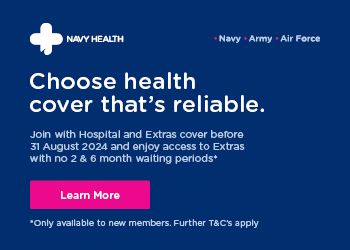Once discharged, you may lose access to Join Health Command and the ADF Family Health program. So, what happens next?
Australia’s public healthcare system consists of four main components: Doctors (or General Practitioners), Pharmacists, Specialists and Professionals, and Hospitals.
Doctors and General Practitioners
When you fall ill or get injured, your initial point of contact is typically a local doctor (also known as a general practitioner), who treats minor illnesses and injuries. If a doctor “bulk bills”, Medicare covers the cost of your appointment; however, most doctors charge an additional out-of-pocket fee.
Medicare, Australia’s government-run insurance scheme, aims to make healthcare more affordable. To gain access to bulk billing and other public healthcare services you will need to register for a Medicare card by visiting their website if you haven’t already.
Pharmacists
Pharmacists specialise in preparing and dispensing medications. They also offer pharmaceutical advice, recommend over the counter medications, and provide services such as health screenings and immunisations. After a doctor’s visit, if prescribed medication, you will need to go to a Pharmacy to get your script filled. The Government’s Pharmaceutical Benefits Scheme reduces the cost of some medications, but out-of-pocket expenses generally still apply.
Healthcare Specialists and Professionals
A healthcare specialist is a doctor with advanced education and training in specific medical fields such as cardiology, psychiatry, and dermatology. If your doctor recommends a specialist, you’ll require a referral. While Medicare may cover a portion of the fee, specialist appointments are expensive and will most likely have an out-of-pocket cost that you’ll need to cover.
Healthcare professionals, such as dentists, physiotherapists, optometrists, and podiatrists, offer treatment and advice based on training and experience. Typically, you pay the full fee for every service and consultation received unless covered by private health insurance.
Hospitals
In your healthcare journey, a medical specialist might recommend hospital admission for further treatment. Public hospitals, provide treatment to all Australians registered with Medicare. While Medicare may cover up to 100% of some costs, lengthy waiting lists may apply, and you can’t choose the hospital, timing, or treating professional.
Private hospitals, may require full payment out-of-pocket, unless the patient is covered by private health insurance. Private health insurance policies may allow you to choose your doctor, avoid lengthy wait lists, experience a higher level of comfort, and select the treating hospital.
Benefits of Private Health Insurance (PHI)
PHI has two cover options: Hospital and Extras. Beyond being able to access private hospital services potentially at a more affordable rate, you also have the option to take out an Extras cover. It may help offset the expenses associated with visits to healthcare professionals depending on your level of cover.
Navy Health is a not-for-profit health fund run to benefit members. For nearly 70 years, we’ve provided quality, affordable health insurance to serving and ex-serving Defence Force members and their families. If you need help navigating your healthcare options when transitioning out of the ADF, don’t hesitate to give our team a call on 1300 306 289.













